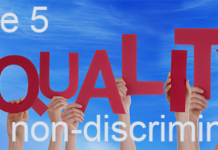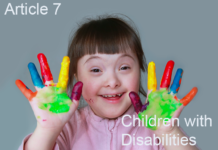A right to communicate
Alternative and Augmentative Communication (AAC) Services in the UK are now funded by NHS England and will provide assessment, review and equipment for those disabled people with the most significant communication support requirements. New ‘communication centres’ will be commissioned by the NHS to control access to communication aids for disabled people using criteria, for the first time to determine which disabled person will be eligible for assessment for communication aids and support. For professionals to determine the inclusion or exclusion of a disabled person based upon their choice of communication is a contravention of article 21 (para b).
Facilitated Communication (FC), is used by a growing numbers of disabled people around the world as their choice of communication – this choice must be protected under article 21. Disabled people have the right to choose their method of communication and not have it dictated to them by professionals or professional organisations.
Sign language
England has the largest Deaf population of the four UK nations and the government has no strategies to facilitate the use of sign languages in official interactions and nothing to recognise and promote the use and acquisition of sign languages. Whilst BSL can be learnt in UK colleges, courses generally require a fee. This hinders widespread learning by all those keen to learn as part of their duties. More pertinently this affects parents who wish to learn so that they can include their Deaf child in their family. We see this as a hindrance to family life when parents and Deaf children cannot communicate with each other. Lack of access to information in sign language affects every aspect of a Deaf person’s life. Lack of access to health information in sign language has resulted in significant health inequalities estimated to be an added cost to the NHS of £30 million pounds.[1]
Government information sources
There is still a significant amount of government information that is only made available in standard print and is difficult or impossible to obtain in an alternative and ‘accessible’ formats. This includes information from the National Health Service, the Department of Work and Pensions, and for local, national and European elections.
[1] Sign Health, Sick of it: A report into the health of Deaf people in the UK, 2014, p. 20. http://www.signhealth.org.uk/sick-of-it-report-professionals/



